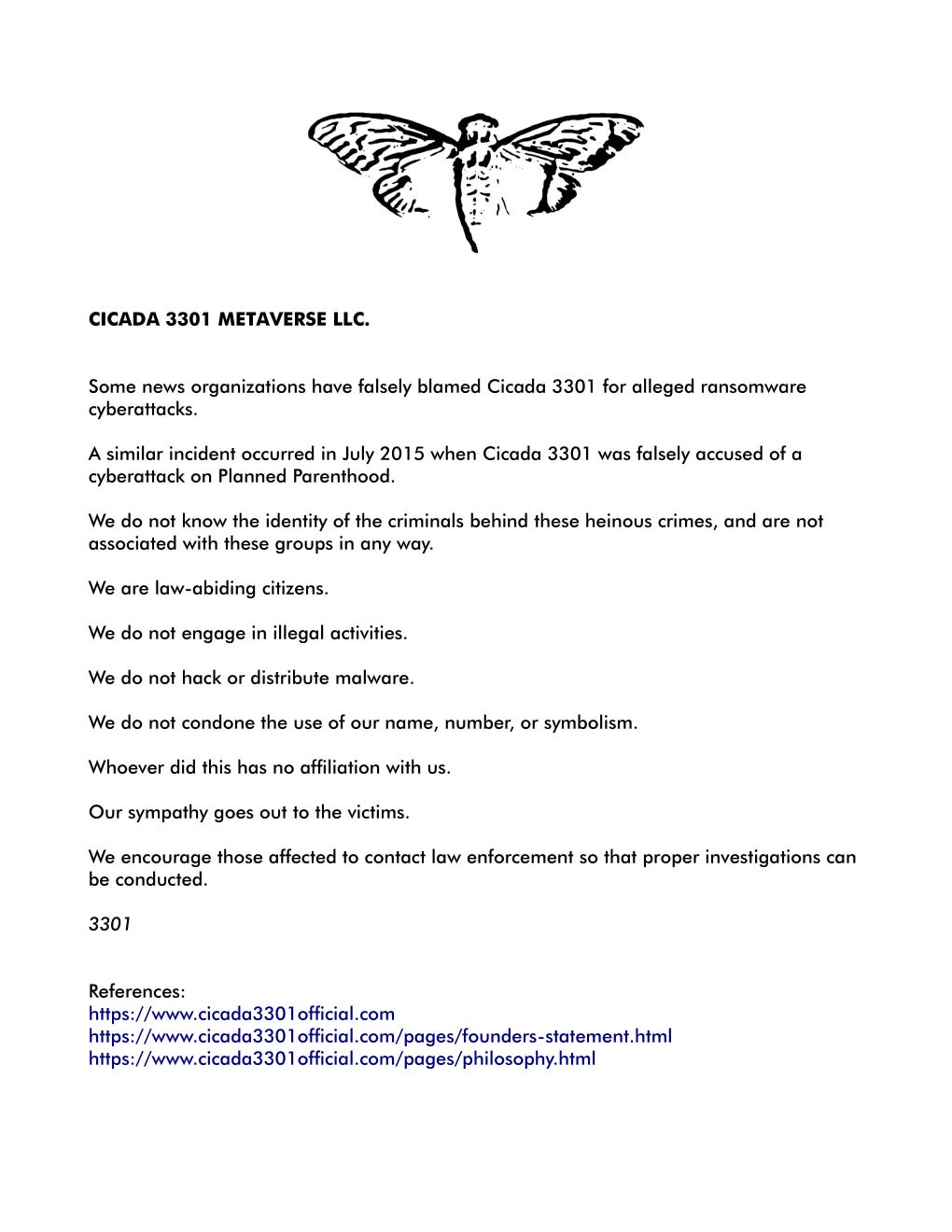Brand Defense Strategist
My new role with Cicada 3301 Metaverse LLC
Ten weeks ago I publicly admitted that Shall We Play A Game? was coming along, thanks to Cicada 3301. This came nearly two years after I first publicly hinted at what I was doing via the Shall We Play A Game? post on rauhauser.org, the Tumblr domain I’m using for this ARG … puzzle … thing.
Like Ong’s Hat and I Love Bees before it, Cicada 3301’s puzzles came to the attention of conspiracy theorists, and then dark side influence operators, who weaponized it.
Yesterday’s Cicada 3301 Counterintelligence was the first public hint that I’m going more than just working on a complex bit of chaos fiction …
Attention Conservation Notice:
Cicada 3301 is starting to benefit from my many year of participation in social movements, my experience with hate group lawfare tactics, my studies in influence operations, counter-insurgency, and the like. This is an introduction to what will be an ongoing campaign to protect the collective’s ability to have fun without getting dragged into crackpot conspiracy theories.
Back Story:
Cicada 3301 first appeared in 2012, releasing an annual puzzle and seeking to recruit “highly intelligent individuals”. The nature of the puzzles being offered were akin to alternate reality game play, but the cryptic nature of the releases led to theories that this was a recruiting effort for the National Security Agency. This agency in particular was a fit - it is their duty to deal with cryptographic problems, and this featured heavily in the puzzles.
The founder, Thomas Schoenberger, is a composer, and the rest of the team share similarities - they’re all brilliant, they’re fascinated by the history of their respective areas, and they fit into that category I’d describe as “wild talent”.
Being an open, clever, playful community, Cicada 3301 got dragged into association with the Qanon conspiracy theory and its associated ISIS-workalike doomsday cult. There was a general effort to do this sort of thing with unwary neurodivergent individuals. I made fun of the whole thing by creating a Twitter account called The_Original_Q, using John Delancey, the actor who player Star Trek’s Q character as its avatar. There are a few dead ends who are STILL trying to make something out of that, despite its obvious mocking of the whole Qanon concept.
I kept bumping into groups involved in these things, simply due to what interests me, and now there’s an effort to clear some of the worst of the accumulated problems. There were documentaries and TV deals in the works, all of which came to naught due to the inability to distance from those with serious mental illness, or malign intent. Cicada 3301 Metaverse LLC’s challenge is to restore the playful, intellectual environment that made it a cultural phenomenon, without getting dragged into things that are even worse, here in 2025.
Brandjackers:
Cicada 3301 Metaverse LLC has nothing to do with the Russian ransomware group that has chosen to use the group’s branding, and there was a public statement about this problem.
I don’t know that we have enough (yet) to file these parasites among the ChewToys, but the nature of the original puzzles drew participants from many nation state intelligence operations. The ransomware group forbids thievery in the Commonwealth of Independent States, but everyone else is fair game. I expect we’ll find some allies who’ve read Attribution of Advanced Persistent Threats.
Litigation:
Thomas and Cicada 3301 Metaverse LLC have filed suit against Professor Laura Dilley and the University of Michigan. While I did not participate in the study that is the root cause of the lawsuit, I know all of the people who were involved, because they got removed en masse from my Wire chat rooms and kicked from my Twitter streaming platform in July of 2020, the month before that study commenced. Assuming this case moves into discovery, the particulars will show up in court filings. Until that happens, this is the extent of what I’ll have to say about it.
Delusional Querulants:
During the months I’ve been exploring the brand’s attack surface I’ve encountered a couple Minds Trapped By Brains, deeply unwell individuals who broadcast their gang stalking delusions in the general direction of Cicada 3301. There isn’t much that can be done about this, unless they are an imminent threat to themselves or others, and that’s not something a remote observer can really discern. The best thing in situations like this is to never engage them at all; if their entire identity is based on being “a person being pursued by entity X”, you simply avoid ever validating them.
Conclusion:
Reality Is Broken, Jane McGonigal’s 2011 book on the value of game play in efforts to effect the real world, was the first formal treatment of ARGs I ever read. Shall We Play A Game? is and will remain opaque, but regarding the tooling I can say that there’s a “humans training AIs by curating knowledge graphs” angle to things. The fundamentals will be FOSS, so that a community of practitioners can grow around it. There will be an opportunity to commercialize via the securing and scaling of such systems, similar to ArangoDB’s pricing model.
I think we’ve got an enormous bubble brewing with the AI companies, but clever curation fueling GraphRAG is something that will survive. The LLM involved can be minimal, the curated data and manner of access means the response process can be reviewed/validated, and it can be used to empower humans, rather than discarding them.
And once you’ve got a system like that, a puzzle … or the pursuit of a ransomware group … or a court case? They all share some similarities in how you’d approach them.



